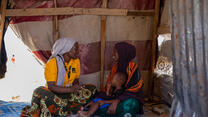WHO WE ARE
The mission of the International Rescue Committee (IRC) is to help people whose lives and livelihoods are shattered by conflict and disaster to survive, recover and gain control of their future. Our vision is that the IRC will lead the humanitarian field by implementing high-impact, cost-effective programs for people affected by crisis, and shape global policy and practice by sharing our learning and experience with others. All IRC programs are designed to achieve meaningful change in people’s health, safety, education, economic wellbeing and ability to influence the decisions that affect their lives.
The Economic Recovery and Development (ERD) unit at the IRC works to ensure that those we serve have their most basic survival needs met and have the combination of assets and income to prosper. The IRC’s enterprise development and employment (EDE) programs prepare crisis-affected populations for employment and self-employment opportunities, support the growth and creation of businesses, improve people’s skills, and increase people’s access to financial services in order to generate income and assets and improve their safety and long-term economic wellbeing.
WHY OUR WORK MATTERS
The World Bank estimates that the global economy will need to create 600 million new jobs over the next 15 years just to keep pace with population growth.
The current average length of displacement for refugees and internally displaced people (IDPs) is now 25 years. In these prolonged crises, the need for jobs and entrepreneurship opportunities is even more pressing. Sustainable income and assets provide the means for crisis- impacted populations both to meet their household’s basic needs in the short-term and to build their self-reliance and growth potential in the long-term.
The IRC creates market-relevant entrepreneurship and general business skills training programs that prepare clients to address market opportunities, support the growth of the local private sector to create employment opportunities, and facilitate access to capital to encourage business expansion or entrepreneurship.
WHAT WE DO
IRC practitioners provide technical assistance to more than 30 country programs. Technical advisors are charged with staying abreast of the best available research and practices in their respective fields and sharing these with the IRC’s frontline teams. They also lead advocacy strategies to encourage partners and policy makers to adopt the interventions proven to be effective based on our research and experience.
The IRC’s EDE programming jointly addresses gaps in (1) labor market supply by providing prospective employees and entrepreneurs the skills and resources they need to find jobs or create businesses and (2) labor demand by providing private sector actors with enterprise development services and capital support to grow employment opportunities.
Our Approach: Bundled Services
The IRC has developed a robust approach to livelihoods programming that addresses three core elements necessary for successful market strengthening, enterprise development and employment growth. While vocational and business skills training has historically been the focus of employment-based interventions in developing economies, research has shown that bundling a variety of employment, self-employment and financial management services can significantly increase beneficiaries’ future income. Further evidence has demonstrated
that employment and self-employment training must be combined with private sector strengthening and access to capital to create the most effective interventions. The combination of services offered vary across a range of emergency and recovery contexts but may include foundational skills development, job placement, entrepreneurship training and private sector strengthening.
Livelihoods Center in Lebanon: The IRC’s center-based model is one method of delivering bundled employment and self-employment services at scale. This innovative model has been successfully piloted in urban contexts in Lebanon in response to the Syrian refugee crisis. By visiting an IRC Livelihoods Center, job seekers are able to access multiple services—such as job matching and referrals, business and life skills training, vocational training, legal counseling and entrepreneurship support—in one place. Business owners and entrepreneurs can access capacity-building support, mentorship opportunities, and business start-up support and grants. To date, 24,000 people in Lebanon have accessed these services through the IRC’s Livelihoods Centers.
Foundational and Business Skills Training
The IRC has extensive experience in entrepreneurship, employment and business skills training. We often partner with local vocational training institutions to adapt and contextualize curricula and match curriculum with mentorship and support by program staff, successful peers and private sector business leaders. Topics covered in IRC-supported trainings are tailored to the specific needs and skills of beneficiaries and range from basic literacy and numeracy skills to business skills such as marketing and accounting to business plan development for those pursuing entrepreneurship endeavors.
Micro, Small and Medium Enterprise (MSMEs) Support
The IRC works to grow the private sector in countries where we work to create jobs and provide new income-earning business opportunities and profit from strengthened value chains. In addition to their regular business operations, MSMEs provide quality goods and services to refugees and IDPs through cash and voucher programming and play a key role in post-crisis recovery by supporting employment creation and training opportunities.
IRC research on MSMEs in Northern Syria and Lebanon showed that MSMEs face a number of barriers to growth and stability, including inadequate supply or reliance on limited wholesaler networks, exchange rate fluctuations, limited access to capital and inconsistent demand. The IRC develops solutions that allow better access to wholesalers, introduce potential new markets or networks, and integrate franchise operations to support transport and access to goods and finance.
Facilitating Access to Financing
Research has shown that access to capital is an essential component to enterprise development. The IRC provides small business grants
to entrepreneurs whom we have helped to develop viable business plans and sets up business plan competitions with cash awards. We work to increase access to traditional financial markets for MSMEs and individuals, at times working directly with local banks and other financial service providers (FSPs) to enable IRC clients to establish savings accounts or receive business loans.
The IRC also creates Village/Urban Savings and Loan Associations (V/USLAs), which allow community members to save their income and direct it to future purposes such as asset acquisition or start-up funding. VSLAs increase business owners’ access to credit, provide collective guaranteeing of individual loans, allow for peer support, and often serve as an intermediary source of business capital before a MSME reaches sufficient scale to take out a traditional loan, or where traditional financing options are unavailable.
Microfranchising in Kenya
The IRC has successfully implemented several microfranchise projects, creating linkages between business skills-trained youth and local private sector companies who wish to grow their market. In Nairobi, Kenya, the IRC implemented Girls Empowered by Microfranchise (GEM). The 2.5-year GEM project supported 944 adolescent girls and 346 partners who operated franchises of four local enterprises. Results showed that the microfranchise model contributed to increased income, savings, self-esteem and goal setting behavior among participating girls.
Agricultural Value Chains in Uganda
The IRC implements agricultural value chain projects across Africa, Europe and Asia to help crisis affected people restart farming as a business. In Northern Uganda, the IRC supported returnees and internally displaced persons (IDPs) who had previously been small farmers to re-enter profitable agricultural value chains like beans, cotton and maize. Participants were trained in agricultural practices and marketing and given access to financial services. After a value chain analysis, IRC staff identified an opportunity to sell cotton to one of the world’s largest cotton processing firms. Initial sales of over $25,000 transformed the lives of more than 400 households.
HOW WE DO IT
Our Core Principles
Market Driven: Providing beneficiaries with the skills required for them to find employment or self-employment will only have impact if these skills are aligned with context-specific market opportunities and responsive to market realities. The IRC develops programming around market assessments, needs and gaps analyses and partner and context mapping to identify the most viable sectors for employment and self-employment opportunities. In this way, we can ensure our programming is relevant and effective for our beneficiaries who will continue to interact with their local markets long after the conclusion of our interventions.
Client Responsive: In the design and implementation of EDE programming, we ensure clients’ voices are reflected in decision- making throughout the project cycle. Market assessments and needs analyses engage our beneficiaries to reflect the needs, skills and preferences of those we serve. We recognize that employment and self-employment programming can only be effective if it is customized to the specific needs of our clients.
Capital Centric: A review of emerging evidence in poor and fragile contexts indicates that vulnerable populations are held back predominantly by a lack of capital, and that the provision of business inputs and tools promotes the growth of businesses and their profitability. Capital-centric programs that focus on start-up grants, cash infusions, and in-kind transfers hold the most promise. Therefore, the IRC’s interventions for micro- and small-enterprises include start-up business grants to ensure people have inputs to establish and grow their businesses.

